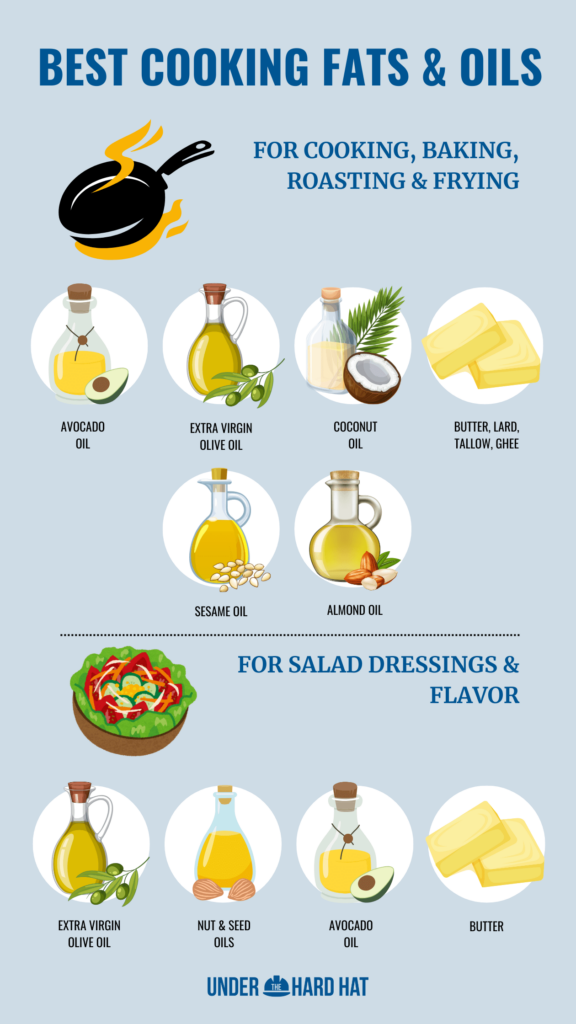On the construction site, you’ve learned that different equipment needs different kinds of oil—you wouldn’t put gear oil in an engine, for example. In the kitchen, cooking oils operate on a similar principle. Oils like extra virgin olive oil, coconut oil, avocado oil, and butter have different tastes and smoke points and are best used for different things. Extra virgin olive oil, avocado oil, and sesame oil top our list of healthy oils for their antioxidant properties and great fat profiles, but consider bypassing industrial seed oils for their adverse health effects.
Quick look
- Extra virgin olive oil, avocado oil, sesame oil, almond oil, and coconut oil are some of the healthiest cooking oils.
- Cooking oils like canola, corn, soy, vegetable, and grapeseed should be consumed in smaller quantities due to differences in extraction methods, GMOs, and saturated fat content.
- Seed oils may cause inflammation and are often used in fast food and restaurant cooking—these are best avoided.
- When choosing cooking oils, consider the smoke point, extraction methods, and saturated fat contents.
5 healthiest cooking oils

1. Extra virgin olive oil
- Smoke point: 350-410 F
- Good for: Sauteeing at low-medium heat, salad dressings
- Shelf life (opened): 3-6 months
- Fat breakdown: 77%+ monounsaturated, 9% polyunsaturated, 14% saturated
- Taste: Rich and somewhat nutty
Extra virgin olive oil (EVOO) is one of the most common cooking oils found in kitchens. Its smoke point ranges from 350 to 410 F, making it a great candidate for salad dressings and low- to medium-heat cooking rather than high-temperature roasting or deep frying. EVOO is rich in omega-3 fatty acids and antioxidants, and its makeup of 77% monounsaturated fats can help lower your LDL or “bad” cholesterol levels.
2. Naturally refined avocado oil
- Smoke point: 500-520 F
- Good for: High-heat frying and cooking
- Shelf life (opened): 6-8 months
- Fat breakdown: 70% monounsaturated, 16% polyunsaturated, 14% saturated
- Taste: Mild and buttery
With a smoke point of 500-520 F, avocado oil is one of the best options for high-heat cooking, frying, and roasting. It has a similar fat profile to EVOO, but its higher smoke point makes it a better option for recipes requiring high temperatures. Avocado oil is high in carotenoids, naturally occurring pigments that neutralize free radicals, protect skin from damage, and may play a role in cancer prevention.
3. Refined almond oil
- Smoke point: 430 F
- Good for: Sauteeing, roasting, using in salad dressings
- Shelf life (opened): 6-8 months
- Fat breakdown: 70% monounsaturated, 20% polyunsaturated, 10% saturated
- Taste: Nutty
Almond oil has a rich, nutty flavor that enhances most dishes and shines in baked goods. Its high smoke point makes it an excellent option for frying, roasting, or cooking over high heat, and it adds a nice depth to salad dressings and sauces. With 70% monounsaturated fats, almond oil is on par with EVOO and has less saturated fat. This oil has anti-inflammatory and antioxidant properties and may also boost the body’s immune system.
4. Sesame oil
- Smoke point: 350 F (unrefined) to 410 F (refined)
- Good for: Low-heat cooking, sauces, and dressings
- Shelf life (opened): Up to 8 months
- Fat breakdown: 40% monounsaturated, 42% polyunsaturated, 9% saturated
- Taste: Strong and nutty
Sesame oil’s bold flavor makes it a great ingredient in Asian-inspired sauces, salad dressings, and low-heat cooking. It is also high in anti-inflammatory components and antioxidants, making it a healthy oil for your diet. Sesame oil’s distinctive taste means it won’t fade into the background of your dishes like a milder oil, so use it when its flavor enhances your meals.
5. Coconut oil
- Smoke point: 350 F (unrefined), 400 F (refined)
- Good for: Baked goods
- Shelf life (opened): Up to two years
- Fat breakdown: 94% saturated, 6% monounsaturated
- Taste: Coconutty and slightly sweet
Coconut oil is high in saturated fat, but don’t stress—its unique composition may offer potential health benefits, making it another solid option for cooking. Being solid at room temperature and slightly sweet, it does lend itself well to vegan dishes in place of butter and desserts. Coconut oil is high in medium-chain triglycerides (MCTs), which can support brain health, improve cholesterol levels, and support weight management. Thanks to its fatty acid profile, coconut oil can be a great addition to a healthy diet.
Cooking oils to avoid
Vegetable and seed oils
Technically speaking, vegetable oil is any oil extracted from a plant. However, the vegetable oil found on store shelves is usually soybean oil blended with canola or corn oil. The term “seed oils” refers to oil extracted from seeds, including sunflower, grapeseed, canola, peanut, sesame, soybean, and corn oils.
Seed oils often have high smoke points (soybean oils is around 450 F), which might make them seem like an excellent choice for cooking. However, the way these oils are extracted, refined, and processed, as well as their fat breakdown, make them less healthy for regular cooking.
Here’s a complete list of oils to avoid:
- Soybean oil
- Sunflower oil
- Safflower oil
- Corn oil
- Canola oil
- Cottonseed oil
- Palm oil (unless sustainably sourced)
- Rapeseed oil
- Grapeseed oil
- Margarine
- Vegetable shortening
The problem with industrial seed oils

Seed oils like canola, sunflower, and soybean oil are commonly used for cooking—especially in fast-food restaurants—because they’re inexpensive and widely available. However, seed oils may pose health risks. The oils are often extracted using harsh solvents and processed with high heat, which can convert polyunsaturated fats into trans fats.
Recently, there has been concern that seed oils can cause inflammation due to high omega-6 fatty acids called “linoleic acids.” While some research supports the idea that the body converts linoleic acids into arachidonic acids, which can contribute to inflammation, other studies disagree.
Some of the biggest problems associated with excess seed oil consumption include:
- Inflammation
- Obesity
Heart disease
- Diabetes
- Alzheimer’s
- Autoimmune disease
- Gut health issues
Although occasional consumption of seed oils isn’t harmful to your health, you likely consume more than you realize when you eat out at the food truck or hit up the drive-through on the way home from work. As a result, you may wish to choose other oils when cooking at home to limit your consumption.
What to look at when choosing a cooking oil
When choosing the right cooking oil, consider several factors, including smoke point, refinement process, and fatty acid composition. This will allow you to maximize its health benefits.
Smoke point
An oil’s smoke point is the point at which heated oil begins to smoke. It determines how much heat an oil can withstand before breaking down and producing harmful compounds. High-heat cooking requires oils with higher smoke points, like avocado oil or animal fats like tallow or duck fat.
Extraction and refinement process
There are many different ways to extract oils from seeds, kernels, and flesh of fruits. Cold-pressed and expeller-pressed oils retain more nutrients and avoid the chemical extraction process many seed oils undergo. Some oils, like canola oil and peanut oil, also undergo bleaching and deodorizing.
Fatty acid composition
All oils are fats, but not all fats are created equal. Choose a cooking oil with a higher percentage of healthy, stable fats, such as monounsaturated fats.
What to look for in cooking oils
The best cooking oils are minimally processed (cold-pressed, expeller-pressed, or unrefined), stable under heat (higher smoke points for frying and sautéing), rich in healthy fats (monounsaturated and saturated fats preferred over polyunsaturated fats). Great options include extra virgin olive, coconut, avocado, and almond oil. Although research isn’t consistent, high-quality animal fats like tallow, lard, butter, ghee, and duck fat can also be suitable options for cooking oils. They have a high smoke point and can be part of a healthy diet when consumed in moderation.
Bottom line
When choosing a cooking oil, prioritize options that are minimally processed, stable at high temperatures, and contain a beneficial fatty acid profile. Olive oil, avocado oil, and sesame oil offer excellent nutrition and support overall well-being, keeping you strong and healthy on and off the job site.
Like this and want more content like it? Sign up for our newsletter and follow us on social media for wellness tips, great recipes, and gear guides!


